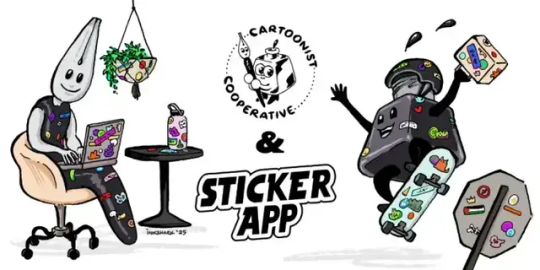#Newsletter Design Company
Explore tagged Tumblr posts
Text
we know EA interfered a lot with veilguard, i definitely do attribute the "sanitization" of the setting directly to EA's meddling, i even think to some extent taash's quest and the corporate representation feel of it all was influenced heavily by EA and not just weekes. and i think a lot of the companions being so shallow and their quests feeling half-baked is also mostly due to time constraints and rewrites/cut content-- the writers genuinely did do the best they could with what they had, and i feel for them and their frustrations. but. there are also just a lot of really bad decisions made elsewhere, too. like i said the racism has always been present in these games and it's always been a problem, it's literally baked into the worldbuilding, though i can definitely agree that some of it was potentially made worse specifically in veilguard due to constant rewrites and the loss of context and cohesion, but like... it was always there to begin with... and it's not "unfair" for players to point this out.
both things can be true-- EA absolutely fucked these people over, and we shouldn't be speculating conspiracy theory-type shit about the writers hating fans or whatever when we know. we know EA interfered, we know there were creative differences, we know they ruthlessly laid off a lot of the people that poured their blood, sweat, and tears into this game! EA is both stupid and actively malicious, they get no sympathy from me. veilguard absolutely is a casualty of the current state of the gaming industry. and i also think there were a lot of poor writing decisions made independently of that as well, that are fair to criticize and question. a lot of these problems are the same problems we've seen in every single DA game, and this consistency makes it clear this is not just an issue with corporate overreach.
but i really feel for everyone involved with making this game, this shit was clearly a very long and tiring fight, i can't even imagine the kind of constant corporate shitstorm they had to deal with for ten fucking years, and personally there is no NDA in the world that would keep me from talking shit. so these guys are stronger than me lol
#sorry i know these are just silly posts on tumblr dot edu but its important to me that people know im mostly being flippant#in some of my negative comments#like i dont think the writers are evil or whatever theyre just humans with biases that are very apparent in some of the things they write#and i also understand they got shafted big time and no one deserves the treatment they got#i could never be a narrative designer or writer in the gaming industry i would be so sickkkkkkkkkk#i follow this one author. the guy who wrote warm bodies. and he sent out a newsletter recently about how he was working on#a huge gaming project for a UK based company#and then the game got scrapped and they sealed all of his writing in a vault to just Never be released#oh i would be on the NEWS!!!!!! i couldn't do it. these people may be insufferable at times but they have my respect#for dealing with this shit. i could never#da posting
373 notes
·
View notes
Text

2022: Marithe + Francois Girbaud Philippines (via @shopify and omnisend): 9.9 Mega Sale: FREE 1 Limited Edition of GIRBAUD INSULATED BOTTLE Newsletter -- @marithefrancoisgirbaud
#tb#marithe francois girbaud#girbaudph#newsletter#website design#shopify#shopify ecommerce development#shopify development company#fashion style#fashion#fashion campaign#editorial#style
0 notes
Text
i have so much on my plate rn but i stay silly regardless

#rambles#internship program will start next week i am so anxious what if i disappoint them what if they realize that im actually a loser adjskjhfks#in the end i picked the company where i know i can put my graphic design skills to use#it's not even related to my program lolz#maybe a bit#i can deal with our newsletter later#i should really train someone in my org to take over that responsibility#i have comms and art collab going on too#and im itching to draw solomon again because i miss him so much#i feel like im forgetting something#is it our thesis#hghghn
1 note
·
View note
Text
did the entire field of graphic design get swallowed up by interns who are bad at using canva
#the company i work for has HR use canva to make eeeeeeeverything. social media posts. newspaper ads. newsletters. t shirt designs. posters.#i see the same three cartoon graphics and two dinky fonts everywhere i look. its like being in an elementary school classroom#i remember being in high school and being told by every third adult who saw my sketchbook that i definitely have a career in graphic design#WELL#WHERES THOSE CAREERS NOW KATHY
1 note
·
View note
Text
A Management Profile. Chester Barnard (1886 -1961) Pioneers of Field of Management)
A Management Profile. Chester Barnard (1886 -1961) Pioneers of Field of Management) A good man is hard to find and that may explain why Chester Barnard was always in demand. The longtime President of New Jersey Bell donated his administrative talent and bundles energy to public services as diverse were the National Science Foundation, the Board of Health of New York City, the Rockefeller…

View On WordPress
#business#company#design#executive#fayolism#fordism#formal#formal organization#grapevine#grouping#Leadership#line manager#Management#manager#newsletter#nsa#research#sociology#structure#talent#taylorism#telecom#theory
0 notes
Text
Digital Marketing Agency South Delhi | Social Media & SEO in Kalkaji | Online Marketing Services

We are a Quality Driven Digital Marketing Agency in Kalkaji, South Delhi, India. Uni Square Concepts provides professional Social Media, SEO & other top digital marketing services.
#Uni Square Concepts#Digital Marketing Agency South Delhi#Digital Marketing Agency India#Digital Media Company in Kalkaji#Social Media Marketing#Search Engine Optimization#Website Designing#Blogs#Newsletter#Bulk E-Mail Campaigns#Search Engine Marketing#SEO#SEM#SMM#Online Marketing Services in Kalkaji#Social Media & SEO Agency in South Delhi
0 notes
Text
Media I imagine different fiction podcasts in instead of the media of being a podcast.
TMA: A selection of volumes, relating to the fears, each with those removable covers. Those covers has a victim or two, and then underneath the cover is a really detailed cover. The paper is decoratively ripped, with a kind of scraggly font, and each has a foreword and ‘author’s note’ from Jonathan Sims.
Malevolent: A really gritty graphic novel with deadly detail in each panel, and very little color. Maybe a trinket on each important character has a color? Like Arthur’s eyes being yellow or Oscar’s collar having a blue sheen to it. The novels are long, dramatic, and intimate in a visceral way.
Welcome to Night Vale: Local 58 bullshit. A broadcast on television with low quality images and audio, tacky music, and a kind of 80’s aesthetic. Each episode the words WELCOME TO NIGHT VALE zoom onto the screen, the purple eye behind them. And each weather segment is an animated short by a different artist.
The Penumbra(Juno Steel): A webcomic. Hours spent scrolling downward a comic that has so much color and GEOMETRIC design. Juno and his curvy jaw, brown pie slice eyes, a cartoonishly high collar for his investigator jacket. Nureyev and his sharp square jaw, shimmering jewelry, and stick legs. Characters sticking out of the panels, fonts changing constantly, a little blue Juno that does his narration and *guitar theme plays* each time he appears.
Wolf 359: A classic comic. Issues month by month. Different special covers of the characters in extra dramatic poses or scenes. Even MORE panel breaking than Juno Steel. So MUCH onomatopoeia, even for small things like the clink of a panel or the disapproving hiss of Hilbert in the background. Geometric designs like Juno Steel, but less colorful. Like the superhero art style mixed with a more stylized look.
Midnight Burger: You pull up the Midnight Burger website. They have a hidden page that has a sort of script-comic thing going on, where the art is next to the writing. Small coded in notes from Leif sometimes pop up if you hold your arrow over the art. Links are attached to the parts where Effie and Zebulon play music, linking you to the music so you can listen to it while you read.
Desert Skies: An animated show. Indie, something you’d find on YouTube. The animation is bouncy and incorporates 3D animation alongside the 2D. Maybe the Sphere Movers have 3D models and the staff don’t? The credits are short because it was made by one guy. People are complaining about it on Twitter /j. People are making content farms about it. Everyone is pissed at Corson like they’re pissed at Jax.
The Amelia Project: A sort of simulation video game. You play as Arthur. You listen to their stories and draw pieces of the tale to invent their death. Every once in a while the game transitions to a point and click suspense game where you solve puzzles as Cole and Haines. Maybe there should even be an Operation-esque part of it where you work as Kozlowski.
Ghost Wax: A novel with a lot of pictures spliced in it. The stories are all in a single book, though the book is through Luca’s perspective— so he picks up on the ghost’s body language and Voncid’s reactions. The pictures are tarot cards with each victim as a card. Some are repeat cards— Lorem does not have a card at the end of the story. Nor does Our Home or Evening at the Ardent. The pictures are only white with black line art. No color whatsoever.
Kakos Industries: A company newsletter. Not a broadcast. A newspaper that arrives at your door and has big bold letters with the main story and pictures of the events that happen in the story as it goes. And the Sunday Comic page is full of employee shenanigans. Some innocent… some not.
I am losing my mind.
#the magnus archives#malevolent#welcome to night vale#the penumbra podcast#wolf 359#midnight burger#desert skies#the amelia project#ghost wax#kakos industries
449 notes
·
View notes
Text
Skinnamarinkstump Linkdump

I'm on a 20+ city book tour for my new novel PICKS AND SHOVELS. Catch me TODAY (Feb 15) for a virtual event with YANIS VAROUFAKIS, and on MONDAY (Feb 17) for an event at KEPLER'S in MENLO PARK with CHARLIE JANE ANDERS. More tour dates here.

It's Saturday and I'm on a book tour, and the world is in chaos, and there are more links to write about than I could fit in to this week's newsletter, so time for a cubic linkdump, the 27th such:
https://pluralistic.net/tag/linkdump/
Let's start with the best thing I saw all week: a 3D-printed, spring-loaded, clockwork chess pawn that uses a magnet to sense when it has reached the end of the board and SPROING! turns into a queen:
https://www.youtube.com/watch?v=CSOnnle3zbA
The whole video is a fascinating account of the design process, from idea to prototype to finished item, but if you're impatient and want to skip right to the eyeball kick, it's at 12:27-12:35. And if you want to print your own, the files are $12 (cheap!):
https://www.patreon.com/WorksByDesign/shop/queen-pawn-3d-printing-files-614491?source=storefront
Regrettably, not every tech project is a good one. This week, Google abandoned its AI ethics pledge. Unlike most AI ethics pledge, which are full of nonsense about not accidentally creating a vengeful god that turns the human race into paperclips, Google's AI pledge was actually very important, in that the company promised not to make AI that violates human rights, international law, or privacy. There comes a point where harping on Google's abandoned "don't be evil" motto can feel a little hacky, but in this case, I'll make an exception. My EFF colleague Matthew Guariglia tears Google a much-deserved new AIhole over this latest heel turn:
https://www.eff.org/deeplinks/2025/02/google-wrong-side-history
Not all bad technology is evil. Some of it is merely very, very stupid. How stupid? Check out Thom Dunn's Wirecutter review of The Heatbit Trio, a space-heater that uses Bitcoin-mining GPUs to generate some of its heat, very slightly offsetting the cost of warming your room – but at a rate that would take decades to recoup the $700 price-tag. Thom got some spicy quotes from Molly White for this one – possibly the first time she's been cited in a home appliance review:
https://www.nytimes.com/wirecutter/reviews/heatbit-space-heater-review/
Staying with crypto freaks for a moment here, Adam Levitin dissects the cryptocurrency "industry"'s latest chorus of aggrieved whining over "debanking":
https://www.creditslips.org/creditslips/2025/02/debanked-by-the-market.html
As Levitin writes, banks aren't kicking cryptocurrency "companies" off their books because the government wants to punish them. Banks have a very good reason to want to avoid doing business with high-dollar scams that have highly correlated implosions, which is to say, times when everyone wants their money back from the cryptocurrency "company" the bank is handling charges for. For a longer explanation that gets into the nitty gritty of bank supervision, check out Patio11's excellent, detailed explainer:
https://www.bitsaboutmoney.com/archive/debanking-and-debunking/
As all the real heads know, "crypto means cryptography," and cryptographers continue to contrive privacy marvels. This week, Kagi – the best search engine, a million times better than Google – released a Privacy Pass authentication plugin, which lets you login to Kagi and run searches without Kagi being able to connect any of the searches you make with your account:
https://blog.kagi.com/kagi-privacy-pass
As an sf/crime writer who sometimes (often) searches for information on committing ghastly crimes and 'orrible murders, the fact that my favorite search engine will be technically incapable of tying those searches to my identity is quite a relief. Read my review of Kagi here:
https://pluralistic.net/2024/04/04/teach-me-how-to-shruggie/#kagi
If you're one of those marvel-contriving hackers, cryptographers, security researchers or tinkerers, you should really consider attending this summer's Hackers on Planet Earth (HOPE), 2600 Magazine's (now) annual (formerly biennial) hacker con. They've just posted their CFP – get those submission in!
https://www.hope.net/cfp-talks.html
Well, I have to post this and get ready for this morning's virtual book tour event with Yanis Varoufakis:
https://www.youtube.com/watch?v=xkIDep7Z4LM
But before I go, one more link: Kevin Steele's 2005 essay on Hypercard, "When Multimedia Was Black & White," an absolute classic, and a beautiful meditation on the art and promise of early hypertext:
https://web.archive.org/web/20240213190609/http://www.kevinsteele.com/smackerel/black_white_00.html
I've known Kevin for most of my life, long before he helped found Mackerel, the pioneering Toronto multimedia company. Long after Mackerel, Kevin went on making wonderful things. In 2023, he published a monumental act of portraiture – a "sequential art" time-series of panoramas of Toronto's hip, ever-changing Queen Street West strip:
https://pluralistic.net/2023/09/13/spadina-to-bathurst/#dukes-cycle
Comparing Kevin's more recent work with that lovely old essay reveals deep correspondences and the progress of a unique and creative soul.

If you'd like an essay-formatted version of this post to read or share, here's a link to it on pluralistic.net, my surveillance-free, ad-free, tracker-free blog:
https://pluralistic.net/2025/02/15/intermixture/#debunking-debanking

#pluralistic#bitcoin#kevin steele#mulitmedia#patio11#adam levitin#thom dunn#eff#wirecutter#linkdump#linkdumps#google#ai#dont be evil#hope#hackers on planet earth#hackercons#privacy pass#kagi#search#debanking#chess#3d printing#clockworks
156 notes
·
View notes
Text
The Best News of Last Week - February 5
1. Austin experimented with giving people $1,000 a month.

People who received guaranteed basic income in one of Texas' largest cities reported reduced rates of housing insecurity. Austin was the first city in Texas to launch a taxpayer-funded guaranteed-income program when the Austin Guaranteed Income Pilot kicked off in May 2022. The program served 135 low-income families, each receiving $1,000 monthly.
2. Germany: Tens of thousands in Berlin protest far right

Around 150,000 people have attended a protest rally in the German capital, Berlin, against the far right and its ideology, the latest in a series of such demonstrations across Germany in recent weeks.
3. Sweden: Where it's taboo for dads to skip parental leave

It's been 50 years since Sweden introduced state-funded parental leave, designed for couples to share. The pioneering policy offers some surprising lessons for other countries.
4. Germany tests 4-day workweek amid labor shortage

While Germany, struggles to find enough workers, dozens of companies are starting an experiment that will see employees work a day less. In February, 45 companies and organizations in Germany will introduce a 4-day workweek for half a year.
5. K9 finds missing endangered 11-yr-old, gives her kisses

An 11-year-old girl, reported to be missing and endangered, is now safe after she was found by a sheriff’s K9 deputy in Wimauma, Florida. Her handler asked if the K9 could give the girl kisses as a reward to the K9 for locating the girl, and the heartwarming moment was captured on the deputy’s body camera.
6. Oregon Zoo releases seven critically endangered condors back to nature in California

Seven California condors were released into the wild in the U.S. state after the endangered animals were hatched and raised at Oregon Zoo.
7. EU will force cosmetic companies to pay to reduce microplastic pollution

Beauty companies will have to pay more to clean up micropollutants after EU negotiators struck a new deal to treat sewage.
Under draft rules that follow the “polluter pays principle”, companies that sell medicines and cosmetics will have to cover at least 80% of the extra costs needed to get rid of tiny pollutants that are dirtying urban wastewater.
---
That's it for this week :)
This newsletter will always be free. If you liked this post you can support me with a small kofi donation here:
Buy me a coffee ❤️
Also don’t forget to reblog this post with your friends.
669 notes
·
View notes
Text
How the mighty have fallen--but will something better come out of it?


I stopped playing "Choices" a few months ago and it's WILD to realize I haven't played "Fictif" since it stopped 3 years ago as well as "The Arcana" when it finished around the early days of "Fictif" (I think), but I feel like I'm experiencing the first nostalgic era of the digital age when it comes to mobile games; the mid to late 2010s was the best era of mobile games, it seems. Of course, after doing some digging, it's WILD to hear about the downfall of the companies that made these games. Nix Hydra (maker of "The Arcana" and "Fictif") is a rabbit hole that I can't even begin to explain, and it's content quickly became second priority when acquired by Dorian, despite Dorian saying it would still prioritize NH's content, instead taking the back seat to Dorian's own app--the app of which I liked in concept, but not execution. In any case, some members of the team from "The Arcana" and "The Last Legacy" from Fictif, as well as other games, made the indie Red Spring Studio company, with their first game "Touchstarved" (which had a Kickstarter that FAR EXCEEDED it's OG goals by 8x; one of the goals included a Nintendo Switch port). I think the game comes out at the end of this year, so I'll be excited to see how it goes. Unfortunately, their Kickstarter page has their updates limited to backers (people who helped fund the project) only, which IMO limits the exposure the game gets, but let's hope for the best.
As for Pixelberry, apparently they've had issues for years, and last year they had massive layoffs and were acquired by an AI company, so...there's that. Plus it seems they're still smut-focused and even the early 2024 art was victim of AI usage, maybe before that. To recooperate their costs, PB closed out two of it's other apps, and while still generating content, is losing the trust of fans, especially since, from what I've seen on their newsletters, they're focused on more "content" for established franchises--which doesn't mean sequels or spinoffs, but often a short book. Anyway, three of their creatives have went on to found Candlelight Games: the Head of Design was once the ex-creative director at PB and helped write "Bloodbound," "Blades of Light and Shadow," "Most Wanted," and "Endless Summer"; the Head of Narrative was an ex-head of Choices and helped write "America's Most Eligible," "The Nanny Affair" (man, the switchup is CRAZY), "With Every Heartbeat," "Distant Shores," and "Ride or Die"; and the CEO was the former VP of new games, an ex-head of Choices, and ex-head of Hollywood U. As someone who became disappointed with many Choices books when the decade hit, this feels promising. The company's first project, "Project Spellstruck" (codename), is expected to start releasing this year.
Seems like the mid-2020s may have me more engaged in interactive mobile games that haven't been exciting for half a decade. Check out these stories and spread the word!


#candlelight games#project spellstruck#touchstarved#touchstarved game#red spring studios#the arcana#nix hydra#fictif#dorian#choices#choices stories you play#pixelberry#pixelberry studios
85 notes
·
View notes
Text
FREEGİVEAWAYCENTER - SİLVER

Online giveaways have become a popular way for companies to engage with their audience and attract potential customers. Understanding the different types of online giveaways can help individuals discern the authenticity of such offers. Some common types of online giveaways include: - Social media giveaways on platforms like Instagram, Facebook, and Twitter - Website giveaways hosted by brands on their official websites - Email giveaways where participants enter by subscribing to a newsletter or mailing list - Sweepstakes and contests with specific entry requirements and rules Being aware of the various formats of online giveaways can assist participants in identifying legitimate opportunities to win prizes like the win iPhone 15 pro max.
iPhone 15 pro max giveaway can present exciting opportunities to win coveted prizes, it is crucial to watch out for red flags that may indicate potential scams or fraudulent activities. Some red flags to be cautious of in online giveaways include: - Requests for payment or purchase to enter the giveaway - Unsolicited messages claiming you have won a prize - Lack of official rules or terms and conditions - Poor website design or unprofessional communication By recognizing these warning signs, individuals can protect themselves from falling victim to online giveaway scams and ensure a safe and authentic participation experience.
Participating in legitimate online giveaways can be a fun and rewarding experience when done thoughtfully and cautiously. To increase the chances of engaging with genuine giveaways and avoiding potential scams, consider the following tips: - Research the hosting company or brand to verify their credibility - Read the giveaway rules and terms carefully before entering - Avoid sharing personal information beyond what is necessary for participation - Be wary of offers that seem too good to be true - Opt for well-known and reputable websites or social media platforms for participation By following these tips and staying vigilant, individuals can navigate the online giveaway landscape securely and potentially win exciting prizes like the iPhone 15 Pro Max.
608 notes
·
View notes
Text
Living online means never quite understanding what’s happening to you at a given moment. Why these search results? Why this product recommendation? There is a feeling—often warranted, sometimes conspiracy-minded—that we are constantly manipulated by platforms and websites.
So-called dark patterns, deceptive bits of web design that can trick people into certain choices online, make it harder to unsubscribe from a scammy or unwanted newsletter; they nudge us into purchases. Algorithms optimized for engagement shape what we see on social media and can goad us into participation by showing us things that are likely to provoke strong emotional responses. But although we know that all of this is happening in aggregate, it’s hard to know specifically how large technology companies exert their influence over our lives.
This week, Wired published a story by the former FTC attorney Megan Gray that illustrates the dynamic in a nutshell. The op-ed argued that Google alters user searches to include more lucrative keywords. For example, Google is said to surreptitiously replace a query for “children’s clothing” with “NIKOLAI-brand kidswear” on the back end in order to direct users to lucrative shopping links on the results page. It’s an alarming allegation, and Ned Adriance, a spokesperson for Google, told me that it’s “flat-out false.” Gray, who is also a former vice president of the Google Search competitor DuckDuckGo, had seemingly misinterpreted a chart that was briefly presented during the company’s ongoing U.S. et al v. Google trial, in which the company is defending itself against charges that it violated federal antitrust law. (That chart, according to Adriance, represents a “phrase match” feature that the company uses for its ads product; “Google does not delete queries and replace them with ones that monetize better as the opinion piece suggests, and the organic results you see in Search are not affected by our ads systems,” he said.)
Gray told me, “I stand by my larger point—the Google Search team and Google ad team worked together to secretly boost commercial queries, which triggered more ads and thus revenue. Google isn’t contesting this, as far as I know.” In a statement, Chelsea Russo, another Google spokesperson, reiterated that the company’s products do not work this way and cited testimony from Google VP Jerry Dischler that “the organic team does not take data from the ads team in order to affect its ranking and affect its result.” Wired did not respond to a request for comment. Last night, the publication removed the story from its website, noting that it does not meet Wired’s editorial standards.
It’s hard to know what to make of these competing statements. Gray’s specific facts may be wrong, but the broader concerns about Google’s business—that it makes monetization decisions that could lead the product to feel less useful or enjoyable—form the heart of the government’s case against the company. None of this is easy to untangle in plain English—in fact, that’s the whole point of the trial. For most of us, evidence about Big Tech’s products tends to be anecdotal or fuzzy—more vibes-based than factual. Google may not be altering billions of queries in the manner that the Wired story suggests, but the company is constantly tweaking and ranking what we see, while injecting ads and proprietary widgets into our feed, thereby altering our experience. And so we end up saying that Google Search is less useful now or that shopping on Amazon has gotten worse. These tools are so embedded in our lives that we feel acutely that something is off, even if we can’t put our finger on the technical problem.
That’s changing. In the past month, thanks to a series of antitrust actions on behalf of the federal government, hard evidence of the ways that Silicon Valley’s biggest companies are wielding their influence is trickling out. Google’s trial is under way, and while the tech giant is trying to keep testimony locked down, the past four weeks have helped illustrate—via internal company documents and slide decks like the one cited by Wired—how Google has used its war chest to broker deals and dominate the search market. Perhaps the specifics of Gray’s essay were off, but we have learned, for instance, how company executives considered adjusting Google’s products to lead to more ���monetizable queries.” And just last week, the Federal Trade Commission filed a lawsuit against Amazon alleging anticompetitive practices. (Amazon has called the suit “misguided.”)
Filings related to that suit have delivered a staggering revelation concerning a secretive Amazon algorithm code-named Project Nessie. The particulars of Nessie were heavily redacted in the public complaint, but this week The Wall Street Journal revealed details of the program. According to the unredacted complaint, a copy of which I have also viewed, Nessie—which is no longer in use—monitored industry prices of specific goods to determine whether competitors were algorithmically matching Amazon’s prices. In the event that competitors were, Nessie would exploit this by systematically raising prices on goods across Amazon, encouraging its competitors to follow suit. Amazon, via the algorithm, knew that it would be able to charge more on its own site, because it didn’t have to worry about being undercut elsewhere, thereby making the broader online shopping experience worse for everyone. An Amazon spokesperson told the Journal that the FTC is mischaracterizing the tool, and suggested that Nessie was a way to monitor competitor pricing and keep price-matching algorithms from dropping prices to unsustainable levels (the company did not respond to my request for comment).
In the FTC’s telling, Project Nessie demonstrates the sheer scope of Amazon’s power in online markets. The project arguably amounted to a form of unilateral price fixing, where Amazon essentially goaded its competitors into acting like cartel members without even knowing they’d done so—all while raising prices on consumers. It’s an astonishing form of influence, powered by behind-the-scenes technology.
The government will need to prove whether this type of algorithmic influence is illegal. But even putting legality aside, Project Nessie is a sterling example of the way that Big Tech has supercharged capitalistic tendencies and manipulated markets in unnatural and opaque ways. It demonstrates the muscle that a company can throw around when it has consolidated its position in a given sector. The complaint alleges that Amazon’s reach and logistics capabilities force third-party sellers to offer products on Amazon and for lower prices than other retailers. Once it captured a significant share of the retail market, Amazon was allegedly able to use algorithmic tools such as Nessie to drive prices up for specific products, boosting revenues and manipulating competitors.
Reading about Project Nessie, I was surprised to feel a sense of relief. In recent years, customer-satisfaction ratings have dipped among Amazon shoppers who have cited delivery disruptions, an explosion of third-party sellers, and poor-quality products as reasons for frustration. In my own life and among friends and relatives, there has been a growing feeling that shopping on the platform has become a slog, with fewer deals and far more junk to sift through. Again, these feelings tend to occupy vibe territory: Amazon’s bigness seems stifling or grating in ways that aren’t always easy to explain. But Nessie offers a partial explanation for this frustration, as do revelations about Google’s various product adjustments. We have the sense that we’re being manipulated because, well, we are. It’s a bit like feeling vaguely sick, going to the doctor, and receiving a blood-test result confirming that, yes, the malaise you experienced is actually an iron deficiency. It is the catharsis of, at long last, receiving a diagnosis.
This is the true power of the surge in anti-monopoly litigation. (According to experts in the field, September was “the most extraordinary month they have ever seen in antitrust.”) Whether or not any of these lawsuits results in corporate breakups or lasting change, they are, effectively, an MRI of our sprawling digital economy—a forensic look at what these larger-than-life technology companies are really doing, and how they are exerting their influence and causing damage. It is confirmation that what so many of us have felt—that the platforms dictating our online experiences are behaving unnaturally and manipulatively—is not merely a paranoid delusion, but the effect of an asymmetrical relationship between the giants of scale and us, the users.
In recent years, it’s been harder to love the internet, a miracle of connectivity that feels ever more bloated, stagnant, commercialized, and junkified. We are just now starting to understand the specifics of this transformation—the true influence of Silicon Valley’s vise grip on our lives. It turns out that the slow rot we might feel isn’t just in our heads, after all.
213 notes
·
View notes
Text
How much should it cost to be a writer?
It depends what route you’re taking. If you are planning to go for traditional publishing, which looks like you finishing a manuscript and then querying agents who will then take your book to publishers, you should be paying for basically nothing. One exception would be if you decide to hire an editor to get a pass over your manuscript and/or query package before sending it off, but this is not required.
If you are in the process of trying to get your manuscript traditionally published, you may be approached by a “publisher” offering to publish your manuscript for a fee. THIS IS A SCAM! An author should never be paying for “publishing services.” Anyone asking you to pay for your own printing, marketing, etc. costs is taking advantage of you. These are called vanity publishers and they will not turn you a profit, help you attract readers, or provide you the prestige of being published.
Always check on Writer Beware - search for the name of the person or company. You can also just google that name along with the word “scam” or “reviews.” In general, don’t let yourself be blinded by dreams, or let yourself be convinced that something is a good idea because you really want it to be true. Never, ever, ever pay a publisher.
If you are going the self-publishing route, you will be paying for certain things, but none of those should be payment to be published. You are the publisher. Uploading your manuscript to Amazon or other marketplaces is free. However, you will be paying for things that a publisher typically pays for. This could include:
-Cover art - you could do this yourself, though this isn't recommended. A good cover is key to a book's success, so budget to purchase a pre-made book cover, or hire a professional cover artist.
To find pre-made book covers, you can just Google "premade book covers," or check one of these sites: BookCoverZone RockingBookCovers Beetiful
And here's a list of places to buy both custom and pre-made cover designs that's a good start. You can also check Reedsy and Etsy for people listing cover design services. If there is a self-pubbed author whose covers you love, try asking them what artist they use.
-Formatting - you could do this yourself using a formatting program like Atticus, or you could hire someone who does professional e-book formatting.
Here's an article on the turbo-DIY route. Here's a list of formatting programs you can use. To hire someone, you can simply search for book formatting services or look at places where people list such services for hire, like Reedsy, Fiverr, or certain Reddit boards.
-Ad campaigns - you may want to pay for ad campaigns on platforms like Meta or Amazon. More niche, author-specific platforms like BookBub, Book Funnel, or Book Sirens also come with certain costs.
-Author services - you may wish to hire an expert in things like marketing, blurb copy, social media metrics, newsletter management, etc. You can find information on that here.
Be aware that scam publishers might try to pitch themselves as "author services" - you should be paying someone to help you with specific aspects of your self publishing work, NOT paying to be published.
-Software and platforms - whether it's a subscription to Duotrope, a paid Scribophile account, access to pro Canva features, etc. you may decide to pay for tools that you will use to do your work well.
-Expert advice - some people offer courses, books, or other resources on how to do specific things like write a compelling blurb or run an effective ad campaign. You may notice that a lot of the links I shared here will include upsells from people doing exactly this!
Be very cautious about this, as most of these people claim that they make tons of money on their self published books, but really, they make their money selling this stuff to people like you. Always check out a person’s free resources first, and wait to invest in this sort of thing until you have a specific question you need answered or are trying to do a very particular thing that you need granular guidance on.
One thing you should NOT pay for is a review, feature, or interview. Self-published authors will be approached by a lot of scammers who claim that, for a nominal fee, they will share information about your book to their huge audiences. These are completely useless and a waste of money. Never spend money on this.
Always keep track of what you are spending on all of this. You may be able to deduct it from taxes you pay on your income from writing, and you will want to really understand what your profit margins look like.
68 notes
·
View notes
Text
The co-op is happy to announce our newest partner: StickerApp!!

(@stickerapp) is a worldwide sticker printing company with over 10 years of experience. To kick off our collaboration, all members will receive a $30 CREDIT if you sign up through the link shared on our members-only newsletter!
If you make stickers through this deal, please share them on social media and tag StickerApp to return your support!
IN ADDITION
We're planning to launch a CO-OP STICKER PACK with designs from 10 chosen artists! Artists will receive a bundle of these sticker packs for free to sell and give away, in exchange for sharing them on social media and tagging StickerApp.

To sign up for this opportunity, as always, check out the members newsletter!
Art Credits:
Image 1 by InkShark
Image 2 by Natalie Mark
33 notes
·
View notes
Note
the show chb logo was also ripped from fandom, like in the past decade all the official chb shirt had the logo without the circle and then the fandom started doing and the show went for it, sorry your tags reminded me of that
[Link to post/tags in question]
Yeah, I know Delphi Strawberry Service has done more circular-based CHB shirt designs for ages, and I've seen the more circular-based designs floating around for awhile. I think Magicbysab's circular-based CHB shirt designs also predate the show design? Those are just the ones I can think of off the top of my head. I understand on a level that if they did base it off fandom designs, particularly if they're basing anything on widespread fanon or fandom-based concepts, it can be difficult to pin down credit or may even seen unnecessary. But if they're going to be doing that I feel like at least they could hire like, a fandom consultant of sorts? Instead of just ripping off from the fandom, hire someone from the community who produces that already so at least there's some recognition and acknowledgement of where it originated.
Heck, in some instances if you ask around in the fandom it's not hard to pinpoint who specifically popularized certain concepts! I could talk for ages about Cherryandsisters being a driving force behind photokinesis!Will, or Saberghatz with plague!Will (tbh between the two they spearheaded a ton of early Will/Solangelo fanon), and I swear Drksanctuary alone is behind like 50% of Alabaster fanon, etc etc etc. People in the fandom know these things! Heck, we know ReadRiordan company knows how to do that kind of thing! They commissioned Viria for the official art, and the UK Riordan newsletter reaches out to fans all the time to feature their work (with credit, they're one of the better ones)! Though in Rick's book tours he did showcase Viria's art (at least with credit) without asking before she got commissioned, and during the Tower of Nero book tours they actually straight up stole a solangelo edit from Pervysloth with completely zero credit (link is to my canon url readriordan parody blog).
I think it doesn't help as well that Rick and his editor allegedly use the fandom wiki in place of a series bible. The PJO wiki is notorious for putting inaccurate information or fanon onto pages at random and having no sources. (What I wouldn't give for the PJO wiki to have frequent book/page sources a la Warrior Cats wiki...) There are what, now almost 18 books in the main series alone? Of an extremely renowned best-selling series that's 20 years old and now being adapted for TV? And they STILL don't have a series bible? That's like, step 1 of writing a series. This kind of reliance of the fandom for resources and concepts definitely isn't new for them.
It just feels so bizarre as to what it says about how the ReadRiordan company views the fandom and the creatives within it. I understand that trying to figure out how to give credit to the concept of "CHB shirt design, but circular!" is difficult, if you even can find out who did that first or popularized it. But if you're going to rip things from fandom, at least find somebody to try and credit? Show that you put in even the tiniest amount of effort? And if you get it wrong and people know, they'll correct you and that's that! But ReadRiordan just keeps trying to actively obscure these kinds of things, even with their own media, not ripped from the fandom, which makes it feel all the worse when it gets pointed out. And a lot of the time the whole reason those concepts get popular is because they're filtered through big names in the fandom! The fandom is a community! We know these people! We can point to them and explain exactly what they popularized! Remember how Velinxi popularized long haired Piper with the heart-shaped flyaways? Goodness only knows how many fandom designs are heavily influenced by Viria and Minuiko and Burdge (and Indigonite and Fuocogo and Ikimaru and Thecottonproject and Joker-ace and Sixofclovers and Vikingmera and Saber and Cherry and and and-). If you are in the community this stuff is easy to find. But Rick and the ReadRiordan company clearly being ~5 years behind with fanon pretty obviously tells me that they're not in the community at all, and aren't bothering trying.
#riordanverse#pjo#readriordan#pjo tv crit#rr crit#Anonymous#ask#long post //#sorry i am passionate about fandom history and crediting artists#its late and im too lazy to proofread right now so im just throwing this one out there#apologies if it's nonsensical#anyways Rick and ReadRiordan stop ripping off literally everyone challenge#stares pointedly at Rick blatantly recycling his own writing. its not a fun callback my guy thats just lazy writing#percy making a dam joke to himself in SoN? cute callback#solangelo falling into tartarus scene in TSATS being a direct rip of percabeth in MoA/HoH? what the hell man
77 notes
·
View notes
Text
Twinkump Linkdump

I'm on a 20+ city book tour for my new novel PICKS AND SHOVELS. Catch me in SAN DIEGO at MYSTERIOUS GALAXY next MONDAY (Mar 24), and in CHICAGO with PETER SAGAL on Apr 2. More tour dates here.

I have an excellent excuse for this week's linkdump: I'm in Germany, but I'm supposed to be in LA, and I'm not, because London Heathrow shut down due to a power-station fire, which meant I spent all day yesterday running around like a headless chicken, trying to get home in time for my gig in San Diego on Monday (don't worry, I sorted it):
https://www.mystgalaxy.com/32425Doctorow
Therefore, this is 30th linkdump, in which I collect the assorted links that didn't make it into this week's newsletters. Here are the other 29:
https://pluralistic.net/tag/linkdump/
I always like to start and end these 'dumps with some good news, which isn't easy in these absolutely terrifying times. But there is some good news: Wil Wheaton has announced his new podcast, a successor of sorts to the LeVar Burton Reads podcast. It's called "It's Storytime" and it features Wil reading his favorite stories handpicked from science fiction magazines, including On Spec, the magazine that bought my very first published story (I was 16, it ran in their special youth issue, it wasn't very good, but boy did it mean a lot to me):
https://wilwheaton.net/podcast/
Here's some more good news: a court has found (again!) that works created by AI are not eligible for copyright. This is the very best possible outcome for people worried about creators' rights in the age of AI, because if our bosses can't copyright the botshit that comes out of the "AI" systems trained on our work, then they will pay us:
https://www.yahoo.com/news/us-appeals-court-rejects-copyrights-171203999.html
Our bosses hate paying us, but they hate the idea of not being able to stop people from copying their entertainment products so! much! more! It's that simple:
https://pluralistic.net/2023/08/20/everything-made-by-an-ai-is-in-the-public-domain/
This outcome is so much better than the idea that AI training isn't fair use – an idea that threatens the existence of search engines, archiving, computational linguistics, and other clearly beneficial activities. Worse than that, though: if we create a new copyright that allows creators to prevent others from scraping and analyzing their works, our bosses will immediately alter their non-negotiable boilerplate contracts to demand that we assign them this right. That will allow them to warehouse huge troves of copyrighted material that they will sell to AI companies who will train models designed to put us on the breadline (see above, re: our bosses hate paying us):
https://pluralistic.net/2024/03/13/hey-look-over-there/#lets-you-and-he-fight
The rights of archivists grow more urgent by the day, as the Trump regime lays waste to billions of dollars worth of government materials that were produced at public expense, deleting decades of scientific, scholarly, historical and technical materials. This is the kind of thing you might expect the National Archive or the Library of Congress to take care of, but they're being chucked into the meat-grinder as well.
To make things even worse, Trump and Musk have laid waste to the Institute of Museum and Library Services, a tiny, vital agency that provides funding to libraries, archives and museums across the country. Evan Robb writes about all the ways the IMLS supports the public in his state of Washington:
Technology support. Last-mile broadband connection, network support, hardware, etc. Assistance with the confusing e-rate program for reduced Internet pricing for libraries.
Coordinated group purchase of e-books, e-audiobooks, scholarly research databases, etc.
Library services for the blind and print-disabled.
Libraries in state prisons, juvenile detention centers, and psychiatric institutions.
Digitization of, and access to, historical resources (e.g., newspapers, government records, documents, photos, film, audio, etc.).
Literacy programming and support for youth services at libraries.
The entire IMLS budget over the next 10 years rounds to zero when compared to the US federal budget – and yet, by gutting it, DOGE is amputating significant parts of the country's systems that promote literacy; critical thinking; and universal access to networks, media and ideas. Put it that way, and it's not hard to see why they hate it so.
Trying to figure out what Trump is up to is (deliberately) confusing, because Trump and Musk are pursuing a chaotic agenda that is designed to keep their foes off-balance:
https://www.wired.com/story/elon-musk-donald-trump-chaos/
But as Hamilton Nolan writes, there's a way to cut through the chaos and make sense of it all. The problem is that there are a handful of billionaires who have so much money that when they choose chaos, we all have to live with it:
The significant thing about the way that Elon Musk is presently dismantling our government is not the existence of his own political delusions, or his own self-interested quest to privatize public functions, or his own misreading of economics; it is the fact that he is able to do it. And he is able to do it because he has several hundred billion dollars. If he did not have several hundred billion dollars he would just be another idiot with bad opinions. Because he has several hundred billion dollars his bad opinions are now our collective lived experience.
https://www.hamiltonnolan.com/p/the-underlying-problem
We actually have a body of law designed to prevent this from happening. It's called "antitrust" and 40 years ago, Jimmy Carter decided to follow the advice of some of history's dumbest economists who said that fighting monopolies made the economy "inefficient." Every president since, up to – but not including – Biden, did even more to encourage monopolization and the immense riches it creates for a tiny number of greedy bastards.
But Biden changed that. Thanks to the "Unity Taskforce" that divided up the presidential appointments between the Democrats' corporate wing and the Warren/Sanders wing, Biden appointed some of the most committed, effective trustbusters we'd seen for generations:
https://pluralistic.net/2022/10/18/administrative-competence/#i-know-stuff
After Trump's election, there was some room for hope that Trump's FTC would continue to pursue at least some of the anti-monopoly work of the Biden years. After all, there's a sizable faction within the MAGA movement that hates (some) monopolies:
https://pluralistic.net/2025/01/24/enforcement-priorities/#enemies-lists
But last week, Trump claimed to have illegally fired the two Democratic commissioners on the FTC: Alvaro Bedoya and Rebecca Slaughter. I stan both of these commissioners, hard. When they were at the height of their powers in the Biden years, I had the incredible, disorienting experience of getting out of bed, checking the headlines, and feeling very good about what the government had just done.
Trump isn't legally allowed to fire Bedoya and Slaughter. Perhaps he's just picking this fight as part of his chaos agenda (see above). But there are some other pretty good theories about what this is setting up. In his BIG newsletter, Matt Stoller proposes that Trump is using this case as a wedge, trying to set a precedent that would let him fire Federal Reserve Chair Jerome Powell:
https://www.thebignewsletter.com/p/why-trump-tried-to-fire-federal-trade
But perhaps there's more to it. Stoller just had Commissioner Bedoya on Organized Money, the podcast he co-hosts with David Dayen, and Bedoya pointed out that if Trump can fire Democratic commissioners, he can also fire Republican commissioners. That means that if he cuts a shady deal with, say, Jeff Bezos, he can order the FTC to drop its case against Amazon and fire the Republicans on the commission if they don't frog when he jumps:
https://www.organizedmoney.fm/p/trumps-showdown-at-the-ftc-with-commissioner
(By the way, Organized Money is a fantastic podcast, notwithstanding the fact that they put me on the show last week:)
https://audio.buzzsprout.com/6f5ly01qcx6ijokbvoamr794ht81
The future that our plutocrat overlords are grasping for is indeed a terrible one. You can see its shape in the fantasies of "liberatarian exit" – the seasteads, free states, and other assorted attempts to build anarcho-capitalist lawless lands where you can sell yourself into slavery, or just sell your kidneys. The best nonfiction book on libertarian exit is Raymond Criab's 2022 "Adventure Capitalism," a brilliant, darkly hilarious and chilling history of every time a group of people have tried to found a nation based on elevating selfishness to a virtue:
https://pluralistic.net/2022/06/14/this-way-to-the-egress/#terra-nullius
If Craib's book is the best nonfiction volume on the subject of libertarian exit, then Naomi Kritzer's super 2023 novel Liberty's Daughter is the best novel about life in a libertopia – a young adult novel about a girl growing up in the hell that would be life with a Heinlein-type dad:
https://pluralistic.net/2023/11/21/podkaynes-dad-was-a-dick/#age-of-consent
But now this canon has a third volume, a piece of design fiction from Atelier Van Lieshout called "Slave City," which specs out an arcology populated with 200,000 inhabitants whose "very rational, efficient and profitable" arrangements produce €7b/year in profit:
https://www.archdaily.com/30114/slave-city-atelier-van-lieshout
This economic miracle is created by the residents' "voluntary" opt-in to a day consisting of 7h in an office, 7h toiling in the fields, 7h of sleep, and 3h for "leisure" (e.g. hanging out at "The Mall," a 24/7, 26-storey " boundless consumer paradise"). Slaves who wish to better themselves can attend either Female Slave University or Male Slave University (no gender controversy in Slave City!), which run 24/7, with 7 hours of study, 7 hours of upkeep and maintenance on the facility, 7h of sleep, and, of course, 3h of "leisure."
The field of design fiction is a weird and fertile one. In his traditional closing keynote for this year's SXSW Interactive festival, Bruce Sterling opens with a little potted history of the field since it was coined by Julian Bleeker:
https://bruces.medium.com/how-to-rebuild-an-imaginary-future-2025-0b14e511e7b6
Then Bruce moves on to his own latest design fiction project, an automated poetry machine called the Versificatore first described by Primo Levi in an odd piece of science fiction written for a newspaper. The Versificatore was then adapted to the screen in 1971, for an episode of an Italian sf TV show based on Levi's fiction:
https://www.youtube.com/watch?v=tva-D_8b8-E
And now Sterling has built a Versificatore. The keynote is a sterlingian delight – as all of his SXSW closers are. It's a hymn to the value of "imaginary futures" and an instruction manual for recovering them. It could not be more timely.
Sterling's imaginary futures would be a good upbeat note to end this 'dump with, but I've got a real future that's just as inspiring to close us out with: the EU has found Apple guilty of monopolizing the interfaces to its devices and have ordered the company to open them up for interoperability, so that other manufacturers – European manufacturers! – can make fully interoperable gadgets that are first-class citizens of Apple's "ecosystem":
https://www.reuters.com/technology/apple-ordered-by-eu-antitrust-regulators-open-up-rivals-2025-03-19/
It's a good reminder that as America crumbles, there are still places left in the world with competent governments that want to help the people they represent thrive and prosper. As the Prophet Gibson tells us, "the future is here, it's just not evenly distributed." Let's hope that the EU is living in America's future, and not the other way around.

If you'd like an essay-formatted version of this post to read or share, here's a link to it on pluralistic.net, my surveillance-free, ad-free, tracker-free blog:
https://pluralistic.net/2025/03/22/omnium-gatherum/#storytime

Image: TDelCoro https://www.flickr.com/photos/tomasdelcoro/48116604516/
CC BY-SA 2.0 https://creativecommons.org/licenses/by-sa/2.0/
#pluralistic#bruce sterling#design fiction#sxsw#Atelier Van Lieshout#libertopia#libertarian exit#wil wheaton#sf#science fiction#podcasts#linkdump#linkdumps#apple#eu#antitrust#interop#interoperabilty#ai#copyright#law#glam#Institute of Museum and Library Services#libraries#museums#ftc#matt stoller#david dayen#alvaro bedoya#rebecca slaughter
86 notes
·
View notes